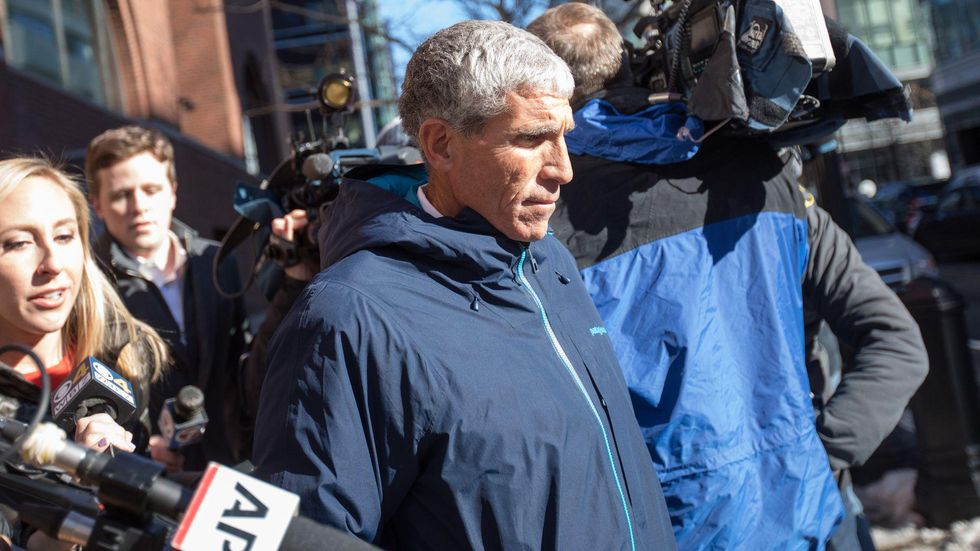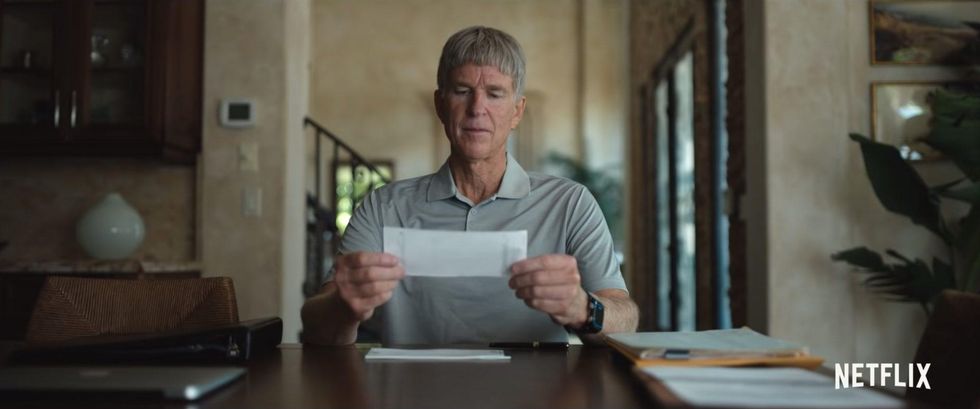Film
Netflix’s “Operation Varsity Blues” Distracts from How Rigged College Admissions Actually Are
23 Mar, 21

Olivia Jade, daughter of Lori Loughlin who was charged with paying to get Olivia into USC
via Red Table Talk on Facebook
The new Netflix documentary Operation Varsity Blues: The College Admissions Scandal is a thorough look at how the college admissions scandal began, worked, and was eventually taken down.
Using the original wiretaps and actual conversations reenacted by actors alongside documentary footage of experts and people close to those indicted, Operation Varsity Blues is exactly as enraging as you would think — a portrait of privilege and a reaffirmation of how easily the extremely wealthy game the system.
When the news of the scandal and Operation Varsity Blues broke in 2019, some were taken with the drama and the spectacular antics of the rich. But for students of color, it hit a different chord.
After dealing with imposter syndrome, which alienates them, and feeling like they were admitted to fill a quota, students of color saw the confirmed truth: Really, it was the most privileged, mostly white students who were unfairly making their way into colleges despite not earning a place.
The danger of Operation Varsity Blues is the way it implies that after the indictments at the end of the film, after the credits roll, everything is okay and colleges admit only the best and most worthy now. But this is not the case.
Operation Varsity Blues: The College Admissions Scandal | Official Trailer | Netflixwww.youtube.com
What was “Operation Varsity Blues”?
The documentary focuses on Rick Singer, the man behind what the FBI dubbed “Operation Varsity Blues.” Under the guise of a legitimate college preparatory agency, Singer used what he called “side doors” to get the children of his wealthy clients into elite colleges.
According to Singer, there were three ways to get into elite, prestigious colleges: the front door, through the standard application process and from merit; the back door, which is through donations of tens or even hundreds of millions of dollars and a longstanding relationship with the institution, which even then may not guarantee admission; or finally, through one of Singer’s “side doors.”
The “side door” method used a combination of donations and relationships with elite institutions. However, those donations were more targeted, going to specific people and departments within universities and costing only a fraction of what a “back door” entry would cost — meaning Singer’s clients would only have to pay a few million dollars, instead of ten times that amount.
Singer focused on athletics departments, donating to the niche sports which often fly under the radar but are gold on a college application. But his process was not about bribing coaches for genuine spots on their teams but instead about fabricating the athletics histories of students to make them look like they were water polo athletes, sailors, or players of any number of esoteric sports.
The documentary took a deep dive into Singer’s process — how he cultivated relationships at colleges, the process of doctoring an application, and the extent to which he lied and cheated on behalf of the parents and the students — as well as the universities he worked with and the clients themselves.
When the news of the scandal broke in real life, so many high profile celebrities and notable business people were publicly implicated, so there was no shortage of names exposed to add to the luster of the scandal. As the documentary points out, in so much of our culture, we love to hate the rich almost as much as we aspire to be them. “They disgust us and they fascinate us,” one featured expert says.
At the end of the film, a montage of some of the indictments plays out, showing real life footage of some of the convicted parents and their prison sentences — most of which were a few weeks or months. Many of the featured parents were not imprisoned at all.
“There’s something incredibly refreshing,” one of the contributors says, “to have a little bit of justice served in a sea of injustice.” However, the light sentences are indicative of the privilege that rich, white people have within the criminal justice system, and they do not feel like justice at all.

Like Most of the System, the College Admissions Process Prioritizes the Rich and White
Rick Singer got his start as a legitimate private college admissions consultant. After being fired from a university coaching position after a losing season, Singer pivoted to college coaching, using his inside knowledge to help students with their applications and to narrow their choices.
As a private tutor, Rick was successful and reputable in his Sacramento neighborhood, where everyone knew that if you wanted a leg up, you would hire him. While this is completely legal, and in some circles normal, there is an immense amount of privilege to have the means and parents with the capacity and experience to hire a private tutor, let alone a reputable (read: expensive) one like Rick.
There are a few moments, when analyzing this phase of Rick’s life, where the documentary begins to touch on what should have been its focus: the college admissions process has always been a rigged game.
While Operation Varsity Blues is openly critical of the mega-wealthy and the way college has become another commodified status symbol in their circles, it creates a false parallel between the extremely wealthy and the kids Rick was coaching in Sacramento, who must have been middle/upper-middle class judging by their testimonies and the community Rick was in — giving the impression that kids who can afford private counselors and coaches are the “normal” American high schoolers when really, most students can’t afford more than the basic services their colleges offer. And many students can’t afford to go to their top choice schools, even if they get in.
Though Singer is undoubtedly criticized in the documentary, Operation Varsity Blues sometimes finds itself painting him as a misguided, eccentric genius. Words like “mastermind” are thrown around to describe a scheme which was really just a combination of privilege, audacity, and reputation, all at work in the pursuit of personal gain. The film takes non sequiturs to discuss irrelevant aspects of Singer’s life — his investments and side businesses, his failed relationship prospects, the details of his life.
If less time was spent trying to unravel the life and mind of a power-hungry white man, Operation Varsity Blues could have used the Rick Singer college scandal as a jumping off point to talk about the more pressing and more insidious (though less glamorous) structures that have kept elite colleges the playgrounds of the rich and white since their inceptions.

The Bigger Picture
Singer’s operation identified the ways privileged kids often get special treatment and pried open a door where there was already an opening.
The niche sports he fabricated profiles for — water polo, sailing, fencing, horse riding, the like — are often sports only the extremely wealthy have the resources to access:. And even without Singer or the addition of an exclusive sport, thousands of wealthy students are getting an edge up for having access to “unique” skills that their peers might not even know exist.
Beyond extracurricular activities, the strength of a student’s transcript is the most important factor for their admission. However, wealthier schools often boost students’ chances with a wider range of advanced classes and more preparation and attention when it comes to standardized tests.
A former Stanford admissions officer featured in the documentary confirmed that on standardized tests like the ACT and the SAT, the most “prominent predictive feature of getting a high test score is family income.”
This is not news. Test prep companies operate for profit, guaranteeing higher scores for a price, and the SAT and ACT boards have long admitted that statistically, wealthier kids do better on their so called “aptitude” tests. So why are they still so important in deciding the college admissions process?
Because colleges are also motivated by the dollar incentive.
In the Singer case, colleges abdicated responsibility, blaming the individual coaches and administrators involved, and were billed as the “victims” of conspiracy and racketeering, but this doesn’t change the fact that they profited immensely from Singer’s donations. The culture of college admissions allowed for Singer to go unchecked for so long, and the profit incentive provided by his “donations” was the driving factor behind the whole operation. While Singer operated at an intense scale, the loopholes were already there and available to exploit.
It makes sense that colleges are motivated by money, and subsequently most elite colleges are filled with wealthy, white students. As one of the experts in Operation Varsity Blues identified, though there is much talk about how Affirmative Action skews admissions in favor of undeserving BIPOC application, the reality is that for most colleges “preferences…skew rich and white.”
So while Singer’s method was blatantly wrong, SAT tutors, essay editors, niche sports coaches, and cushy donations to admissions officers are legal. And they might not guarantee a student a spot, but they do guarantee a second look.
What affluence really buys is this: the privilege to be paid increased attention.
In Operation Varsity Blues, Singer is an obvious bad guy, an easy target. The documentary, and even the FBI investigation, had the chance to really unravel the inner working of elite institutions, but of course the institutions of elitism and whiteness persisted.
The documentary was released in March, while all over the country, colleges are sending out decision letters to students, and rich kids are getting into their top choices at disproportionate rates. Par for the course.














